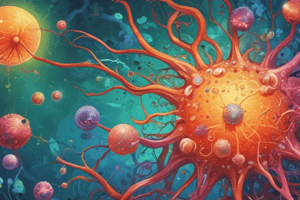Podcast
Questions and Answers
What is the role of Fc receptors in the immune response?
What is the role of Fc receptors in the immune response?
- They synthesize antibodies in response to pathogens.
- They produce cytokines that recruit immune cells.
- They bind to the Fc region of antibodies and aid in phagocytosis. (correct)
- They neutralize toxic substances in the bloodstream.
Which immune mechanism involves coating pathogens for better recognition by phagocytes?
Which immune mechanism involves coating pathogens for better recognition by phagocytes?
- Opsonization (correct)
- Agglutination
- Complement activation
- Neutralization
What do neutralizing antibodies specifically target on viruses like SARS-CoV-2?
What do neutralizing antibodies specifically target on viruses like SARS-CoV-2?
- Spike proteins (correct)
- Proteins within the viral capsid
- Viral RNA
- Lipids on the viral envelope
Which type of receptor binds to the Fc portion of IgG?
Which type of receptor binds to the Fc portion of IgG?
Which function is not attributed to antibodies in host defenses?
Which function is not attributed to antibodies in host defenses?
What are antibodies classified as?
What are antibodies classified as?
Which of the following statements is true about antigens?
Which of the following statements is true about antigens?
What are haptens?
What are haptens?
What is an epitope?
What is an epitope?
What characterizes a substance as being immunogenic?
What characterizes a substance as being immunogenic?
Which fragments result from the cleavage of antibodies by proteolytic enzymes?
Which fragments result from the cleavage of antibodies by proteolytic enzymes?
What do heavy chains and light chains refer to in antibodies?
What do heavy chains and light chains refer to in antibodies?
What is the name of the site on an antibody that binds to the antigen?
What is the name of the site on an antibody that binds to the antigen?
What process does somatic hypermutation enable?
What process does somatic hypermutation enable?
Which region of the antibody is altered during class switching?
Which region of the antibody is altered during class switching?
What role do cytokines and T cells play in class switching?
What role do cytokines and T cells play in class switching?
Antibodies are used in which of the following diagnostic applications?
Antibodies are used in which of the following diagnostic applications?
Which process occurs simultaneously with class switching?
Which process occurs simultaneously with class switching?
What is seroconversion?
What is seroconversion?
Which of the following best describes the primary immune response?
Which of the following best describes the primary immune response?
What triggers the secondary immune response?
What triggers the secondary immune response?
What is the role of somatic recombination in the immune system?
What is the role of somatic recombination in the immune system?
How does the immune system create a diverse antibody repertoire?
How does the immune system create a diverse antibody repertoire?
What is the function of somatic hypermutation?
What is the function of somatic hypermutation?
What is responsible for the initial antibody repertoire?
What is responsible for the initial antibody repertoire?
Which of the following statements about the heavy chain of immunoglobulins is correct?
Which of the following statements about the heavy chain of immunoglobulins is correct?
What type of antibodies are produced in response to natural immune reactions or after immunization?
What type of antibodies are produced in response to natural immune reactions or after immunization?
What is the initial antibody type that increases first after immunization?
What is the initial antibody type that increases first after immunization?
What technology is used to produce an unlimited supply of monoclonal antibodies?
What technology is used to produce an unlimited supply of monoclonal antibodies?
Which statement about the preparation of monoclonal antibodies is true?
Which statement about the preparation of monoclonal antibodies is true?
Which definition relates to the binding site of an antibody to its specific antigen?
Which definition relates to the binding site of an antibody to its specific antigen?
What is the main focus of the learning objectives stated in the document?
What is the main focus of the learning objectives stated in the document?
What term describes the enhanced binding strength of an antibody to an antigen due to multiple binding sites?
What term describes the enhanced binding strength of an antibody to an antigen due to multiple binding sites?
Which process involves the fusion of myeloma cells and B cells to create hybridomas?
Which process involves the fusion of myeloma cells and B cells to create hybridomas?
Flashcards are hidden until you start studying
Study Notes
Antibodies
- Antibodies are proteins that bind specifically to antigens.
- Antibodies belong to the class of proteins called immunoglobulins (Igs).
- Antibodies are the secreted form of the B-cell receptor.
- Antibodies are secreted from differentiated B cells called plasma cells.
Antigens and Immunogens
- Antigens are molecules that can bind specifically to an antibody or generate peptide fragments recognized by T-cell receptors.
- Immunogens are substances that can elicit an adaptive immune response.
- All antigens have the potential to elicit specific antibodies, but some need to be attached to an immunogen.
- All immunogens are antigens, but not all antigens are immunogenic.
Requirements for Immunogenicity
- A substance must possess the following characteristics to be immunogenic:
- Foreignness
- High molecular weight
- Chemical complexity
- Degradability
Haptens
- Small organic molecules of simple structure that fail to induce immune responses.
- Immune response can be provoked if a hapten is attached to a protein carrier.
Antigen, Epitope and Paratope
- Epitope is a part of an antigen that binds to an antibody or an antigen receptor.
- Antibodies are specific for epitopes rather than the whole antigen.
- Paratope is the part of an antibody that recognizes and binds to the antigen (antigen binding site).
Antibody Structure
- Antibodies are composed of two types of protein chains:
- Heavy chains (2)
- Light chains (2)
- Antigen binding region varies extensively between antibody molecules and is known as the variable or V region.
Antibody Function
- Antibodies act as adaptor molecules for immune effector systems.
Fc Receptors
- Fc receptors (FcRs) are expressed on a number of different cells and bind the Fc region of antibodies:
- Fcγ receptors on macrophages and neutrophils bind to the Fc portion of IgG.
- Fcα receptors on myeloid cells bind to the Fc portion of IgA.
- Fcε receptors on mast cells, basophils and activated eosinophils bind to the Fc portion of IgE.
Antibody Participation in Host Defenses
- Neutralization: Binds to pathogens and blocks access to cells.
- Opsonization: Coating of pathogens and foreign particles.
- Complement Activation: Activation of the classical complement pathway.
Neutralizing Antibodies and SARS-CoV-2
- Neutralizing antibodies bind to Spike proteins on the surface of SARS-CoV-2, preventing the virus from binding to and entering the host cell.
Phagocytosis
- Phagocytosis of bacteria is greatly enhanced in the presence of antibodies.
Immune Response and Secretion of Antibodies
-
Seroconversion: The phase of an infection when antibodies against the infecting agent are first detectable in the blood.
-
Primary response: First exposure to an antigen.
- Slow, sluggish, and short-lived.
- Low levels of antibodies.
-
Secondary response: Second exposure to an antigen.
- Rapid, strong, and long-lasting.
- High levels of antibodies.
Antigens Activate Specific Clones of Lymphocytes
- The clonal selection hypothesis:
- Each B cell carries a single type of antibody receptor.
- When an antigen binds to the B cell receptor, it activates that B cell to proliferate and differentiate into plasma cells that secrete antibodies.
Fighting Infection by Clonal Selection
- The clonal selection hypothesis is a key concept in understanding how the adaptive immune system fights infection.
Development of the Antibody Repertoire by Gene Recombination
- The immune system creates billions of different antibodies with a limited number of genes.
- Diversity of the antibody repertoire is generated by:
- Somatic recombination
- Somatic hypermutation
- Class switching
V(D)J Recombination is Responsible for the Initial Antibody Repertoire
- Somatic recombination: Rearrangement of segments of genomic DNA within immunoglobulin during B cell development in the absence of antigen.
Secondary Diversification of the Antibody Repertoire - Somatic Hypermutation
- Somatic hypermutation: Random mutation that occurs in the V region and diversifies the antibody repertoire.
- Alters the affinity of the antibody for antigens.
- Occurs at the same time as class switching, both involving the enzyme activation-induced cytidine deaminase (AID).
Somatic Hypermutation Enables Affinity Maturation
- Affinity maturation: Results in the increased affinity for an antigen.
- BCRs are selected for progressively higher affinity for an antigen during an immune response.
Secondary Diversification of the Antibody Repertoire - Class Switching
- Class switching: Involves the C region of the heavy chain only and increases functional diversity of antibodies.
- Antigen specificity is retained.
- Cytokines and T cells play a major role in class switching.
- Isotype switching is greatly affected by the tissue environment:
- Partly due to different cytokines released by T cells at different sites.
Use of Antibodies as Diagnostic, Therapeutic, and Research Tools
- Due to their high specificity and selectivity, antibodies are of great use in:
- Diagnostics: Detection of infections, measurement of biological markers, recognition of allergies.
- Therapeutics: Treatment of cancer, infectious diseases, autoimmune diseases.
- Research: Immunohistochemistry, Western blots, flow cytometry.
Types of Antibodies
- Polyclonal antibodies: Antibodies generated in a natural immune response or after immunization.
- Monoclonal antibodies: Antibodies produced by a single clone of B lymphocytes, resulting in a homogeneous population of antibodies.
Production of Polyclonal Antibodies
- Polyclonal antibodies are produced by immunizing an animal with an antigen.
Blood Antibody Levels After Immunization
- After immunization, IgM levels initially increase.
- With repeated immunization, IgG levels increase.
Preparation of Monoclonal Antibodies
- Production of monoclonal antibodies:
- Hybridoma technology: Fusion between immortal myeloma cell and an antibody-producing B cell.
- Recombinant technology: Synthetic antibody or antibody fragment generated by recombinant DNA technology.
Learning Objectives
- Describe the basic structure of antibodies.
- Functions and properties of antibodies.
- Define: antibody, antigen, epitope, paratope, immunogen, hapten, affinity, avidity, valency, idiotype, isotype, allotype.
- Discuss antigen-antibody interactions.
- Discuss generation of the antibody repertoire.
- Discuss the use of antibodies in therapeutics and diagnostics.
- Discuss the preparation of monoclonal antibodies.
Studying That Suits You
Use AI to generate personalized quizzes and flashcards to suit your learning preferences.


